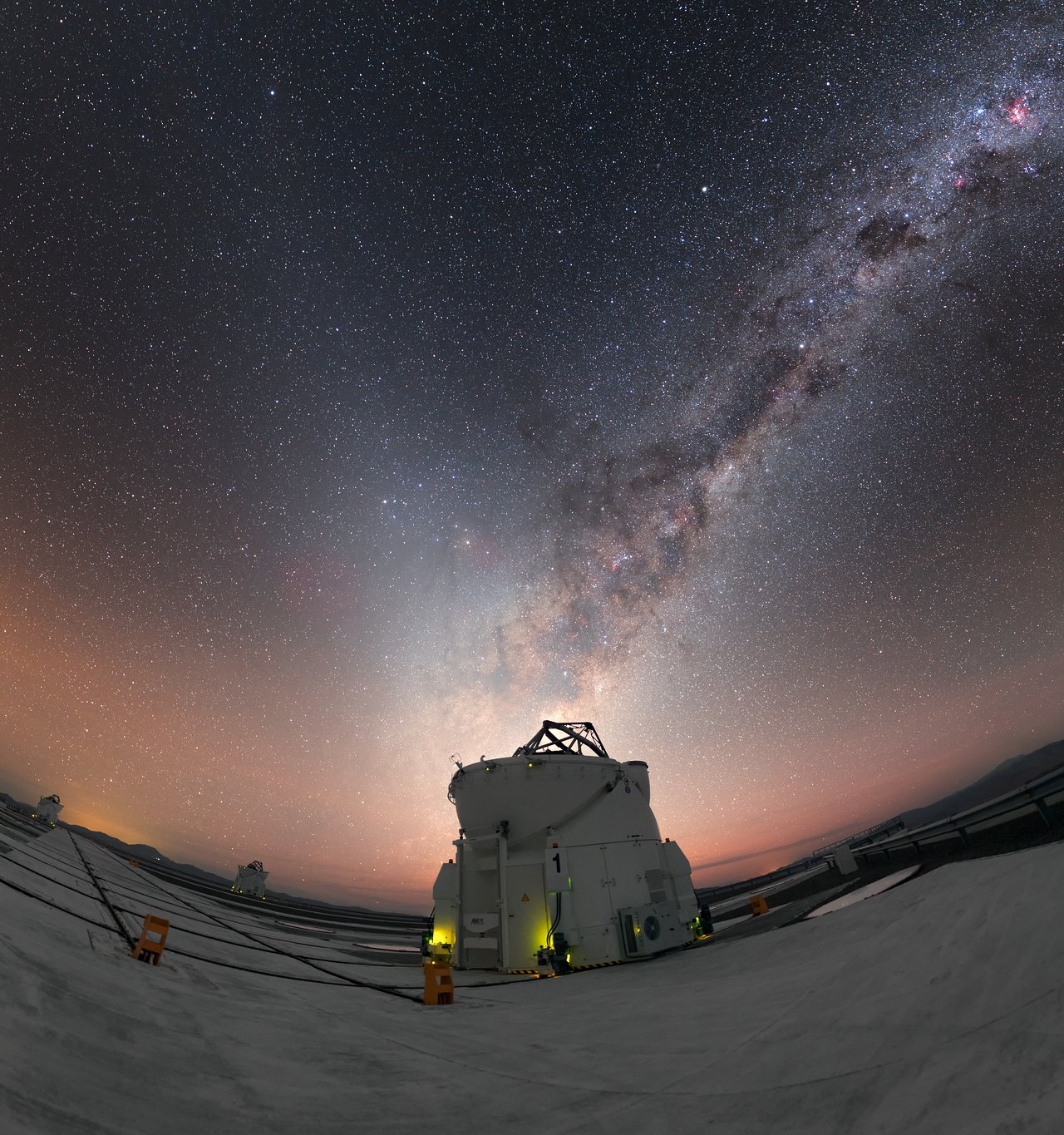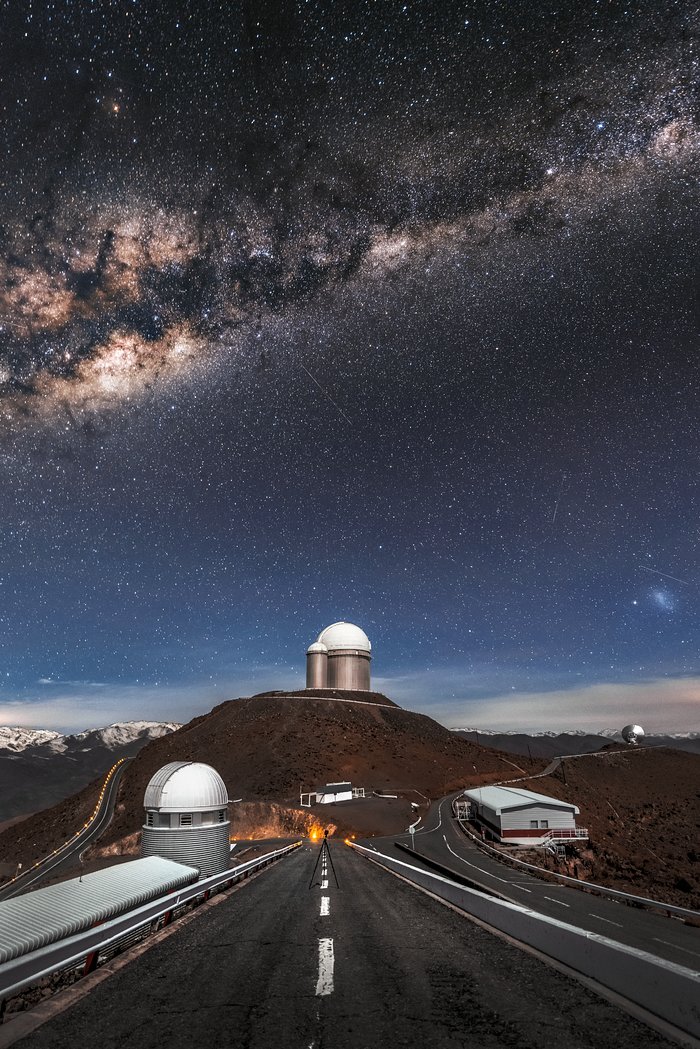Page 2 of 2
MILKY WAY CASSIOPEIA TO SAGITTARIUS
Posted: Sun Aug 26, 2018 5:55 pm
by shaunnesy
I have been shooting with my star adventurer and canon 6D a few nights ago at my local dark sky spot in Suffolk UK
Spent 2 nights as astronomical darkens returned to this latitude . The result is a stacked panoramic of 10 x 50 second images in each pane of which there are 8 .
Had to deal with a combine harvester going up and down fields opposite and time exposures to suite!
Used my Sigma 50mm Art lens and shot at ISO 2000 , f2.8
One image labelled
Re: Found Images: 2018 August
Posted: Sun Aug 26, 2018 6:00 pm
by Ann
starsurfer wrote: ↑Sun Aug 26, 2018 4:45 pm
When on Earth is Adam Block going to release an image of a planetary nebula?! I've been waiting years!

http://www.caelumobservatory.com/gallery/nebulae.shtml
I just don't post them, because the planetaries don't interest me!

Ann
Re: MILKY WAY CASSIOPEIA TO SAGITTARIUS
Posted: Sun Aug 26, 2018 6:03 pm
by Ann
shaunnesy wrote: ↑Sun Aug 26, 2018 5:55 pm
I have been shooting with my star adventurer and canon 6D a few nights ago at my local dark sky spot in Suffolk UK
Spent 2 nights as astronomical darkens returned to this latitude . The result is a stacked panoramic of 10 x 50 second images in each pane of which there are 8 .
Had to deal with a combine harvester going up and down fields opposite and time exposures to suite!
Used my Sigma 50mm Art lens and shot at ISO 2000 , f2.8
One image labelled
Great images! They would have been even greater if they had been a little bit bigger!
You took them from Suffolk, UK? Great job!

Ann
Re: Found Images: 2018 August
Posted: Sun Aug 26, 2018 6:07 pm
by Guest
Thanks. Unfortunately, have you keep file size under limit to post here . Yes shot in Suffolk UK
Re: Found Images: 2018 August
Posted: Sun Aug 26, 2018 6:18 pm
by Ann
Guest wrote: ↑Sun Aug 26, 2018 6:07 pm
Thanks. Unfortunately, have you keep file size under limit to post here . Yes shot in Suffolk UK
Contact Geckzilla. She just helped another person here post a large picture, when he was unable to do so himself.
Ann
ESO: V is for VLT
Posted: Mon Aug 27, 2018 2:37 pm
by bystander
V is for VLT
ESO Picture of the Week | VLT | 2018 Aug 27
This
Picture of the Week shows a huge celestial “V” emblazoned across the night sky over ESO’s Paranal Observatory, which is situated atop
Cerro Paranal in Chile.
One arm of the “V” is noticeably clearer than the other; the right arm, pointing towards the top right corner of the frame, is traced out by the beautiful star-studded centre of the
Milky Way. The fainter arm, leaning leftwards, is formed of glowing columns of diffuse
zodiacal light, a phenomenon caused by incoming sunlight that is scattered by small particles of
cosmic dust.
While we often see both the Milky Way and zodiacal light at Paranal thanks to the site’s famously clear skies, the “V” alignment shown here is unusual. Zodiacal light is related to the Earth’s path through space, as the dust particles responsible for scattering the sunlight are all within a cloud that lies on the
ecliptic plane (dubbed the
zodiacal cloud). Because of this, the glow varies in strength and visibility throughout the year, and is best seen in spring and autumn just after sunset or before sunrise. The opportunity to observe a beam of zodiacal light seeming to emanate from the very centre of the Milky Way comes only once per year, during January. For more information on this cosmic phenomenon, see ESOcast 82: Zodiacal light (
esocast82a).
In the crook of the “V” sits one of ESO’s
Very Large Telescope’s 1.8-metre Auxiliary Telescopes (
ATs) — of which there are four in total. Each AT is housed in a robust enclosure that protects the delicate telescope and instrumentation from the harsh, arid desert conditions experienced at the site. Two other ATs are visible in the background towards the left side of the image.
The picture was taken by ESO Photo Ambassador
Petr Horálek.
Re: Found Images: 2018 August
Posted: Mon Aug 27, 2018 2:50 pm
by shaunnesy
Ann wrote: ↑Sun Aug 26, 2018 6:18 pm
Guest wrote: ↑Sun Aug 26, 2018 6:07 pm
Thanks. Unfortunately, have you keep file size under limit to post here . Yes shot in Suffolk UK
Contact Geckzilla. She just helped another person here post a large picture, when he was unable to do so himself.
Ann
Thanks Ann , yes i updated and posted larger files now so hopefully enough resolution -)
HEIC: GOODS-South Hubble Deep UV Legacy Field
Posted: Mon Aug 27, 2018 2:54 pm
by bystander
GOODS-South Hubble Deep UV Legacy Field
ESA Hubble Picture of the Week | 2018 Aug 27
Following on from
last week’s Picture of the Week, this week we showcase the second part of the Hubble Deep UV (
HDUV) Legacy Field, the
GOODS-South view. With the addition of new ultraviolet light imagery, astronomers using the NASA/ESA Hubble Space Telescope have captured the largest panoramic view of the fire and fury of star birth in the distant Universe, encompassing 12 000 star-forming galaxies.
Hubble’s
ultraviolet vision opens up a new window on the evolving Universe, tracking the birth of stars over the last 11 billion years up to the cosmos’s busiest star-forming period, which happened about three billion years after the
Big Bang.
So far, ultraviolet light has been the missing piece of the cosmic puzzle. Now, combined with data in
infrared, and
visible light from Hubble and other space- and ground-based telescopes, astronomers have assembled the most comprehensive portrait yet of the Universe’s evolutionary history. The image straddles the gap between the very distant galaxies, which can only be viewed in infrared light, and closer galaxies, which can be seen across different wavelengths. The light from distant
star-forming regions in remote galaxies started out as ultraviolet, but the
expansion of the Universe has shifted the light into infrared wavelengths. By comparing images of star formation in the distant and nearby Universe, astronomers can get a better understanding of how nearby galaxies grew from small clumps of hot, young stars long ago.
The observation programme harnessed the ultraviolet vision of Hubble’s Wide Field Camera 3 (
WFC3). This study extends and builds on the previous Hubble multi-wavelength data in the
CANDELS-Deep (Cosmic Assembly Near-infrared Deep Extragalactic Legacy Survey) fields within the central part of the
GOODS (The Great Observatories Origins Deep Survey) fields. This mosaic is 14 times the area of the Hubble Ultraviolet Ultra Deep Field (
UVUDF) released in 2014.
Re: Found Images: 2018 August
Posted: Mon Aug 27, 2018 4:22 pm
by starsurfer
Sh2-216 and Sh2-221
https://www.astrobin.com/300374/
Copyright: Tommy Nawratil
Sh2-216 on the right is in Perseus and Sh2-221 on the left is in Auriga.
Re: Found Images: 2018 August
Posted: Tue Aug 28, 2018 1:45 pm
by starsurfer
WR 134 nebula
https://www.astrobin.com/301102/C/
Copyright: Doug N. Jiang
Re: Found Images: 2018 August
Posted: Thu Aug 30, 2018 11:23 am
by starsurfer
NGC 6726-7
https://www.astrobin.com/307836/0/
Copyright: Kevin Parker
Re: Found Images: 2018 August
Posted: Thu Aug 30, 2018 11:26 am
by starsurfer
Barnard's E (B142-3)
https://www.astrobin.com/310799/0/
Copyright: Sven Hoffmann
Re: Found Images: 2018 August
Posted: Fri Aug 31, 2018 6:23 pm
by starsurfer
NGC 7497
https://www.astrobin.com/314964/0/
Copyright: Jason Guenzel
ESO: Unrivalled Vistas at La Silla
Posted: Mon Sep 03, 2018 2:28 pm
by bystander
Unrivalled Vistas at La Silla
ESO Picture of the Week | 2018 Sep 03
ESO’s
La Silla Observatory, situated in northern Chile, offers the resident telescopes unrivalled views of both the cosmos and the region’s barren, but
beautiful landscape. Photographed by
Alberto Ghizzi Panizza from the ramp leading to ESO’s New Technology Telescope (
NTT), this view captures La Silla under the magnificence of the Milky Way, which unmistakably carves its way across the night sky overhead.
Sitting proudly at the centre of the frame is the ESO
3.6-metre telescope, host of the planet-hunting
HARPS instrument. Below sits the small grey and white enclosure (nicknamed the sarcofago, or sarcophagus) of the Télescope à Action Rapide pour les Objets Transitoires (
TAROT). To the far right, the silver-sheened back of the decommissioned 15-metre Swedish-ESO Submillimetre Telescope (
SEST) can be seen atop an isolated peak, and, finally, to the left of the road in the foreground sits the corrugated paneling and white dome of the Swiss 1.2-metre
Leonhard Euler Telescope.
La Silla is located in the southern part of the
Atacama Desert, 600 kilometres north of Santiago de Chile and at an altitude of 2400 metres. The site was ESO's first ever observing site, and has been in operation since the 1960s.
HEIC: Hazy Dust in Ursa Major (NGC 4036)
Posted: Mon Sep 03, 2018 2:36 pm
by bystander
Hazy Dust in Ursa Major
ESA Hubble Picture of the Week | 2018 Sep 03
This week’s
NASA/ESA Hubble Space Telescope image showcases the galaxy
NGC 4036: a
lenticular galaxy some 70 million light-years away in the constellation of
Ursa Major (
the Great Bear).
This galaxy is known for its irregular lanes of dust, which form a swirling spiral pattern around the centre of the galaxy. This core is surrounded by an extended, hazy aura of gas and dust that stretches further out into space and causes the warm, fuzzy glow that can be seen here. The centre itself is also intriguing; it is something known as a
LINER-type (Low-Ionisation Nuclear Emission-line Region) galactic nucleus, meaning that it displays particular emission lines within its spectrum. The particularly bright star visible slightly to the right of the galactic centre is not within the galaxy itself; it sits between us and NGC 4036, adding a burst of brightness to the scene.
Due to its relative brightness, this galaxy can be seen using an amateur telescope, making it a favourite amongst backyard astronomers and astrophotography aficionados.
Re: Found Images: 2018 August
Posted: Tue Sep 04, 2018 9:01 am
by starsurfer
Doesn't it make sense to start the September threads by now?!



